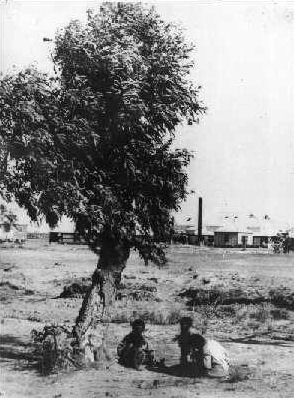The Boiling Down Works
The first Boiling Down Works began production in 1867. It was managed by the Edkins Brothers (from a well known pastoral family in North Queensland) on behalf of the Scottish-Australia Investment Company.
Late in 1866, the Edkins purchased steam plant in Sydney and attempted to expand and diversify the already existing small commerce between Batavia and Burketown in brine-cured meat.
Edkins went to Sydney, probably in October 1866, to purchase the machinery for the Boiling Down Works. Claims for a fourteen day record trip by the schooner Gazelle, which was reputedly so laden with plant that she broke her back on the Albert bar, do not make 1866 a feasible starting date although this was advertised. The venture came too late to be an effective marketing outlet for the pastoral industry and did not survive beyond 1870.
Business at that time was difficult — freight costs, the remoteness and the run on the Banks (the Queensland Bank suspended payment). There were no sales for sheep and cattle.

Landsborough Tree, Burketown
Tree blazed by Landsborough, meatworks in background
John Oxley Library image
Sheep were the favoured stock in the earliest days of grazing, but quickly succumbed to liver-fluke, footrot, lung worm and spear grass, dashing the hopeful expectations of profitable export of wool clips from the port of Burketown.
The late 1860s were a period of financial crisis. The State Government was broke and offering rewards for gold in a desperate attempt to regain solvency. There was also the great difficulty created by the Gulf Fever. The evacuation of Burketown's population to Sweers Island during 1866 virtually left the town to creeping abandonment.
After the romance with the prospect of limitless markets had passed, there was nothing that could be done with surplus stock. So the only way out of bankruptcy that seemed worth trying was the boiling down of beef for fallow and other by-products.
Pastoralists were already walking off their runs and in the Burke Pastoral District alone 115 runs were deserted during the three years, 1867-1869.
Despite these problems (or perhaps because of them) a second boiling down works was started in the 1870s by another company. Little is known about this venture but it also failed. '...And so the tide of settlement rolled back from the outposts. About 1868, even the settlement at Burketown was quite deserted; not a living soul remained, and nothing was left to mark the spot except heaps of empty bottles, jam tins, and some large iron pots belonging to a one time boiling down plant. A few stumps remained standing in the open plain where once had been buildings.'
The author of these words, Sir Hudson Fysh, forgot the cemetery; perhaps also the wharf and neglected to mention that the skills of archaeologists would probably unearth other memorials of the wild times.
However, it seems that Burketown was never really completely deserted for too long, and optimism, along with the meat business, was resurrected.
In May of 1898, M. P. Durack after '... much negotiation with Queensland Stock Inspectors and cattle buyers, at last arranged for the sale of one mob at Hughenden and the other to the Endeavour Meat Export Agency that was due to open in Burketown in May that year. The mobs had no sooner moved off with their respective drovers, than the news reached M.P. by special messenger, that the new processing works had been destroyed by fire.'
In 1901 Queensland Meat Export and Agency Limited purchased the Burketown Meat Export Company, which seems to have earlier taken over the business of the Endeavour Meat Export Company.
By 1905 only 88 town residents are listed, although the works continued in the business of canning, extracting, tallow refining and fertiliser production.
The Queensland Meat Export Company and Agency Limited sold these works (probably in 1902) to the Torrens Creek Meat Export Company, which later sold to Mr N. McIntyre of Escott Station, Burketown.